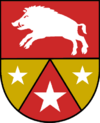Forsvarsstyrken
| Littish Armed Forces | |
|---|---|
| Forsvarsstyrken | |
 Logo since 2006 | |
| Motto | Pro Patria et Pupli (For Country and People) |
| Founded | 1913 |
| Current form | 2006 |
| Service branches | |
| Headquarters | Kaslund |
| Leadership | |
| President | |
| Minister of Defence | |
| Chief of Defence | |
| Personnel | |
| Military age | 18 years of age |
| Conscription | No (since 2006) |
| Active personnel | 88,000 (2021) |
| Reserve personnel | 25,000 (2021) |
| Expenditure | |
| Budget | $6.1 billion (2021) |
| Percent of GDP | 1.4% (2021) |
Forsvarsstyrken (Littish: /fɤʒʋɑʃst̪ʏkxɘɳ̊/ , "the Defence Force") is the armed forces of Littland whose purpose is the defence of Littland. It also supports international peacekeeping efforts and provides humanitarian aid. As of 2021 the Littish Armed Forces has a strength of 88.000 active military personnel along with 25,000 in reserve. The current Minister of Defence is Sebastian Anker with the Chief of Defence, responsible for more immediate military matters, being Martin Feldt. The Armed Forces is organized into 4 branches, the Army (Hæren), the Navy (Marinen), the Airforce (Flyvevåbnet) and The Civil Defence (Civilforsvaret) who acts as home guard. Combined, the Littish military has a budget of $6.1 billion which accounted for 1.4% of the nominal GDP in 2021.
History
Origins
The modern Littish Armed Forces were established following the Littish Civil War and would focus less on offensive operations compared to its predecessor, the Royal Littish Army.
Current form
In 2006, alongside the abolishment of conscription, the Armed Forces were reorganized. Many former units and installations were merged, split or disbanded. This was done as an attempt to modernize the Littish military, which had been "stuck in the 80s" and to help boost morale through a volunteer force instead of conscripts. The reorganization is viewed as a success and the funding from further military modernization initiatives have helped the Armed Forces stay up to date. By 2021 the defense budget was 28.7 billion Đ, up from only 9.1 billion Đ in 2005.
Branches
Army
Hæren is Littlands Army and consists of 3 divisions, the army is the largest branch of the Littish military. The Army largely focuses on infantry warfare, but still has sizeable mechanized and armored capabilities.
Marinen is Littlands Navy and has 23 ships of varying sizes. The commissioned ships include 2 corvettes, 14 patrol vessels as well as 7 auxiliary vessels. The ships are organized into task forces. Task Force Alpha is the largest, with the corvettes Einar and Thorvald, and is stationed at Klinstrup Navalbase.
Air Force
Flyvevåbnet is Littlands Air Force as well as its best maintained and funded branch, it has 92 aircraft of different types. As of 2021 the Air Force uses 4 airbases around Littland, the largest of these, Klinstrup Airbase, was originally opened in 1921 and also functions as the headquarters for Flyvevåbenet.
Home Guard
Civilforsvaret (The Civil Defence) is Littlands Home Guard and emergency management force. It consists of 25,000 personnel who also acts as the army reserve. Only in times of crisis and war can the High Command take command over the Civil Defence. The Civil Defence uses a variety of different civilian transport vehicles and have the C7 Rifle as their standard rifle.
Personnel
Women were banned from serving in the Armed Forces up until the 1986 Constitution, where equal right to serve was introduced. As of 2021, only 4.7% of all personnel, from all branches, are women. Women, as oppossed to men, did not have conscription but had to ability to serve if they so chose. Conscription was abolished entirely in 2006 for all genders and a vast majority of the Armed Forces is made up of volunteers.
Structure
- Military High Command
- Combat Units:
- 1st Infantry Division - Officium Et Supra
- 2nd Infantry Division - In Actis Esto Volucris
- 1st Armored Division - Celeriter et secure
- Auxillery Units:





